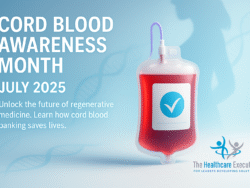Group B Strep Awareness Month – July 2025

- Posted by Greg Wahlstrom, MBA, HCM
- Posted in Health Observance Calendar
Hospital Leadership in Maternal and Neonatal Safety
Published: July 01, 2025
Each July, Group B Strep Awareness Month shines a spotlight on an important yet often overlooked threat to maternal and newborn health. Group B Streptococcus (GBS) is a type of bacteria carried by up to 30% of pregnant women, often without symptoms. However, it can cause serious infections in newborns if transmitted during childbirth. Hospitals and healthcare systems are instrumental in educating patients, implementing screening protocols, and ensuring timely antibiotic prophylaxis. As highlighted in our Health Observance Calendar, awareness months like this offer healthcare leaders an opportunity to review policies and reinforce patient education efforts. Routine GBS screening between 35 and 37 weeks of pregnancy has become a standard of care, significantly reducing neonatal infections. Hospital executives can ensure protocols are consistently applied and staff are trained in current guidelines. Public awareness is essential to empower expectant parents to discuss GBS screening with their providers. The Healthcare Executive remains committed to supporting hospital leaders in efforts to improve perinatal outcomes and reduce preventable neonatal infections.
Approximately 10-30% of pregnant individuals carry GBS without any symptoms, bringing into focus why routine screening is significant. Left undetected, GBS can be passed to newborns during delivery, resulting in potentially life-threatening conditions. Hospitals contribute significantly by maintaining efficient screening systems and protocols for administering intrapartum antibiotic prophylaxis (IAP) when necessary. Group B Strep Awareness Month serves as a valuable opportunity for healthcare organizations to audit their compliance with national and international guidelines, including those from the CDC. As Verani et al., (2019) notes, “Our data highlight the importance of adherence to national guidelines for perinatal GBS disease prevention.” Education is a core component, not only for patients but also for clinical teams who must stay current on updates in recommendations and protocols.
Hospital leaders can collaborate with public health organizations, professional societies, and community partners to expand awareness and distribute educational materials. Expectant parents benefit from clear, culturally sensitive information about GBS risks and the importance of screening. By integrating GBS education into prenatal classes and digital health tools, hospitals can promote informed decision-making. The Healthcare Executive emphasizes that hospital leadership is essential in preventing neonatal infections. Group B Strep Awareness Month is a time to reaffirm the healthcare community’s commitment to maternal and newborn health through evidence-based practices.
Emerging research continues to expand our understanding of GBS prevention. Scientists are exploring potential vaccines aimed at reducing maternal colonization and vertical transmission to infants. Hospitals with active research programs are essential partners in advancing these trials and translating findings into clinical care. As Madhi et al. (2023) highlight, “Globally, an estimated 319,000 neonatal GBS cases, 90,000 infant deaths, and 57,000 stillbirths were attributed to GBS infection in 2020, highlighting the considerable public health burden.” They emphasize that “Maternal vaccination against GBS holds promise to reduce the burden of invasive neonatal GBS disease.” Group B Strep Awareness Month highlights the importance of hospital engagement in research and innovation, ensuring patients receive accurate, balanced information about new developments like potential vaccines. Hospitals help bridge the gap between research and everyday clinical practice. By participating in clinical trials and sharing research updates with their communities, healthcare institutions can help shape the future of maternal and neonatal care. The Healthcare Executive encourages hospitals to remain at the forefront of regenerative and preventive medicine. Group B Strep Awareness Month is an opportunity for hospital leaders to align strategic priorities with cutting-edge science for better patient outcomes.
Despite medical advancements, health disparities remain a pressing issue in GBS prevention and care. Studies show that certain populations, particularly marginalized communities, face barriers in accessing prenatal care and GBS education. Hospitals have a vital role in eliminating these disparities by tailoring outreach and resources to diverse populations. Group B Strep Awareness Month serves as a call to action for healthcare leaders to review diversity and inclusion initiatives within maternal health services. Collaborating with community organizations, faith-based groups, and culturally competent care teams helps hospitals reach broader audiences and deliver equitable care. Hospitals can also advocate for public policies supporting funding for GBS research, screening programs, and patient education efforts. As Centers for Disease Control and Prevention (CDC, 2024) emphasizes, “The best way to help protect your baby from GBS is to get tested for GBS bacteria during pregnancy and, if necessary, receive antibiotics during labor.” Embedding equity principles into GBS prevention strategies ensures that all patients, regardless of background, receive high-quality, evidence-based care. The Healthcare Executive urges leaders to explore how hospital policies and partnerships can drive health equity. Group B Strep Awareness Month underscores the collective responsibility of healthcare systems to protect maternal and neonatal health through compassion and innovation.
As Group B Strep Awareness Month unfolds this July, The Healthcare Executive recognizes hospitals and healthcare professionals leading efforts to protect mothers and newborns from GBS infections. From implementing routine screening protocols to participating in innovative research, hospitals are pivotal in creating a future where preventable infections are minimized and outcomes are improved. As the American Academy of Pediatrics (2021) suggests, “Implementation of intrapartum antibiotics prophylaxis guidelines has led to an 80% reduction in the incidence of early-onset GBS disease since the 1990s,” highlighting the success of current prevention strategies while underscoring the need for continued research and global efforts to eliminate neonatal GBS disease. This observance is about more than science—it’s about empowering families with knowledge and choices that can profoundly impact health outcomes. Hospital executives are essential in driving these efforts forward through policy development, staff training, and community engagement. Group B Strep Awareness Month invites healthcare leaders to reflect on progress made and identify opportunities for further advancement. The Healthcare Executive remains dedicated to providing resources and insights that support hospital leaders navigating the complex landscape of maternal and neonatal health. Together, we can build a future where every family receives the care, education, and protection they deserve. Let’s honor Group B Strep Awareness Month by championing innovation, compassion, and health equity across healthcare systems.
Discover More
For additional information, visit our Health Observance Calendar and explore national resources from the CDC and Group B Strep International. Together, we can advance equitable care and empower families with lifesaving knowledge.
Internal Resources
- The Healthcare Executive. (2025). Health observance calendar. The Healthcare Executive. https://www.thehealthcareexecutive.net/category/health-observance-calendar/
- The Healthcare Executive. (2024). Mastering healthcare financial management in 2024: Strategies for success. The Healthcare Executive. https://www.thehealthcareexecutive.net/article/mastering-healthcare-financial-management-in-2024-strategies-for-success/
- The Healthcare Executive. (2025). International Prenatal Infection Prevention 2025. The Healthcare Executive. https://www.thehealthcareexecutive.net/health-observance-calendar/international-prenatal-infection-prevention-2025/
- The Healthcare Executive. (2025). The Healthcare Executive homepage. The Healthcare Executive. https://www.thehealthcareexecutive.net/
External Resources
- Group B Strep International. (n.d.). Group B Strep resources. Group B Strep International. https://www.groupbstrepinternational.org/
- Centers for Disease Control and Prevention (CDC). (2024). Group B Strep and pregnancy. CDC. https://www.cdc.gov/groupbstrep/index.html
- Moorhead, R., Daley, A. J., Lee, L. Y., Gorelik, A., & Garland, S. M. (2019). Compliance with screening for and recommended management of maternal group B streptococcus carriage in pregnancy. Australian and New Zealand Journal of Obstetrics and Gynaecology, 59(6), 837–842. https://doi.org/10.1111/ajo.12977
- American Academy of Pediatrics. (2021). Updated guidance: Prevention and management of perinatal group B streptococcus disease. NeoReviews, 22(3), e177–e187. https://doi.org/10.1542/neo.22-3-e177



